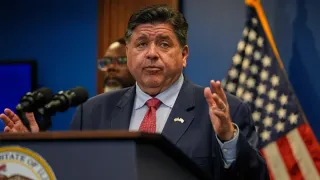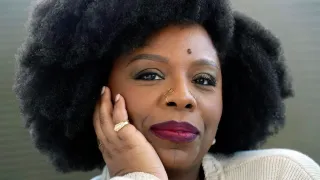
Sep 3
Yes, Weighted Vests Can Help Amp Up Your Workout
Kenya Hunter READ TIME: 3 MIN.
In the fitness class Jessie Syfko created for a nationwide gym chain, exercisers wear weighted vests that add a challenge to their workouts.
“People start to realize how good it feels to work just a little bit harder and a little bit smarter” without actually changing what they’re doing, said Syfko, senior vice president for Life Time gyms.
Weighted vests are increasingly showing up in fitness classes and on jogging tracks, touted by social media influencers as a way to keep bones healthy, improve performance and even accelerate weight loss. They are exactly what they sound like – vests that add resistance to the torso through pockets with removable weights.
But there's a lack of robust research on their benefits, experts say, so it's unclear how much of the hype is justified. And some people, such as seniors or those who are pregnant, should be cautious about using them.
Here are the potential benefits of weighted vests
When you think about how exercise works, the idea that a weighted vest will help you meet fitness goals like weight loss, muscle growth or preventing bone loss might make sense on the surface. Adding weight to the vest adds resistance to your everyday activities without changing up your patterns.
The vests may, in fact, offer benefits for healthy adults, experts say – although no one should expect transformative or instant results. Jeff Monaco, a certified strength coach who teaches medical fitness at the University of Texas at Austin, said while you may not lose a lot more calories during a weighted vest exercise, resistance from the vest may result in better sports performance over time.
“There are a lot of studies looking at (the weighted vest) from a speed perspective in different athletics, like soccer, with changing direction, agility and speed and so forth,” he said.
You’ll start to see those benefits by adding about 10% of your body weight to the vest, he said. If you weigh 150 pounds, for example, that would mean adding a total of 15 pounds to the vest.
But the research outside of sports isn’t as clear.
One 2020 study from Wake Forest University School of Medicine in North Carolina found that adults between 60 and 85 years old who wore weighted vests at times during the day when they were most active lost about the same amount of weight as those who didn’t wear them. They also lost the same amount of bone density, which happens as we age but can be slowed by building muscle.
Here's how to use weighted vests safely
Experts urge people to use weighted vests safely.
It’s best to start out by adding between five to 10 percent of your body weight. Wearing a vest that’s too heavy can put unnecessary strain on your joints, back and hips. That extra load can throw off your posture, lead to poor form or even result in stress fractures over time.
Some people should consult with a doctor before they throw on a vest, said Dr. Elizabeth Gardner, a team physician for athletes at Yale University. They include people who are pregnant, suffer from heart and breathing conditions or have back or neck injuries.
You'll have to use the muscles in your abdomen to use a weighted vest effectively, Gardner said, and this can be tougher for those already managing back pain.
Before starting to use a vest, Monaco said it's always helpful to get guidance from someone who has experience with them, “just to make sure that your movements are good, your form is good, that you have enough muscular upper body, muscular strength and endurance to support that during your movements.”
But as long as you use it correctly, he said, a weighted vest can be “a good tool to have in your toolbox.”






